Madam Irene closes the door of her office and climbs the stairs. She is on her way to teach her first ever class at St Jude’s Girls’ Secondary School.
One of the youngest teachers at St Jude’s, Madam Irene is charismatic and popular amongst her students. She has a quick wit and a wisdom beyond her years.
“I’m looking forward to teaching in the new school,” she says, drinking in her surroundings. “When girls are supported, you are supporting the whole community.”
Madam Irene walks into her pristine classroom, sitting down at freshly burnished desks are 25 Form 4 girls. The walls are freshly painted, the blackboard is untouched and through the open windows is the sound of a lawn mower, chugging away.
“Welcome back from the holidays girls,” says Madam Irene. “It’s the start of a New Year! I hope you had a good rest.”
When Madam Irene was in Form 6, her year level had 480 students. Only two of these students achieved Division One exam results (the highest grade) and Madam Irene was one of them.
When she graduated from Form 6, the school asked her to come back and help out with their students. Madam Irene quickly learnt that she had a talent for teaching and went on to study at Makumira University in Arusha.
Growing up, both of Madam Irene’s parents played a pivotal role in supporting her throughout her life, with her mother being an important figure in her education.
“She brought me up to be a responsible person,” says Madam Irene. “To be confident, and to work hard, to earn what I’m supposed to earn, not to expect things to happen.”
These are lessons she hands on to her students, lessons that tie in nicely with today’s class topic.
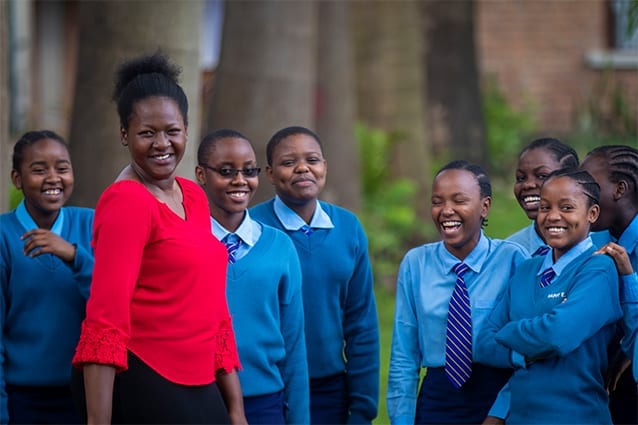
“Today we will be studying a new topic,” says Madam Irene. “Culture!”
“So, what is culture?”
The students raise their hands and offer answers.
“Culture is the way you dress.”
“Culture is the language you speak.”
“Culture is the food you eat.”
For Madam Irene and her fellow teachers, teaching at the new girls’ school is an opportunity to establish a new culture and a new beginning for these students.
There have been times in Madam Irene’s career when she has been the only woman in a room filled with men.
“Being a woman in the midst of men can be challenging,” says Madam Irene. “If I speak things, then some men will think I’m too emotional, or sometimes I’m expected to wait for men to speak first - it’s challenging.”
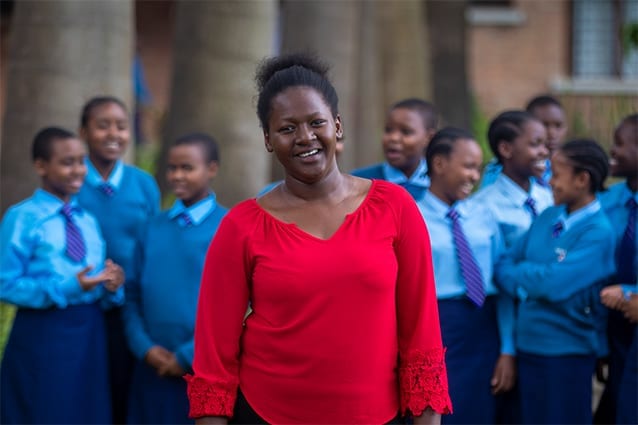
But Madam Irene is seeing a lot of change and women are now contributing to society in a diverse range of roles - as political leaders, in business and even driving cars, something that in the past was uncommon.
“I know there are other women behind me who are supporting me and when men see a balance of 50-50 in a room they will not look down upon me, they will see an equal.”
As a civics teacher, there will be many opportunities for Madam Irene to discuss equality with her students.
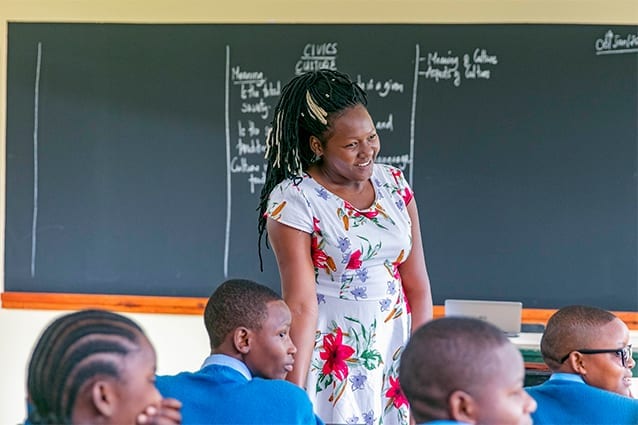
“They will get to know their rights,” she says. “For example, our constitution does not differentiate men and women – we are all equal!”
As the class moves on, the students begin talking about their tribes, comparing different handshakes. Madam Irene approaches one of the students, Susie, who is sitting by the wall.
“Susie,” says Madam Irene. “Come and show me how a woman would greet a man in your tribe.”
Madam Irene poses as a man, and Susie curtsies in front of her, offering a handshake.
“You know,” says Madam Irene. “In some tribes a woman has to kneel before reaching a man.”
As Madam Irene speaks she moves to the front of the classroom and stands proudly, knowing that she is in the privileged position of showing these students what an independent, capable woman can achieve.
Sponsor a student’s academic scholarship and support them in reaching their full potential.
A stone's throw away from The School of St Jude's original building, stands a crowd of people. They chatter quietly amongst themselves, anticipation rife.
It is the morning of the 10th of January and the crowd are gathered to officially open St Jude’s Girls’ Secondary School.
The pounding of the drums begins and the school choir launches into a beautiful rendition of the Tanzanian National Anthem. Approaching up the pathway is School Founder, Gemma Sisia, accompanied by His Grace, the Archbishop of Arusha, Isaac Amani, and the Honourable Adelardus Kilangi, Attorney-General of Tanzania – who began driving at 1am in order to be the guest of honour at the ceremony.
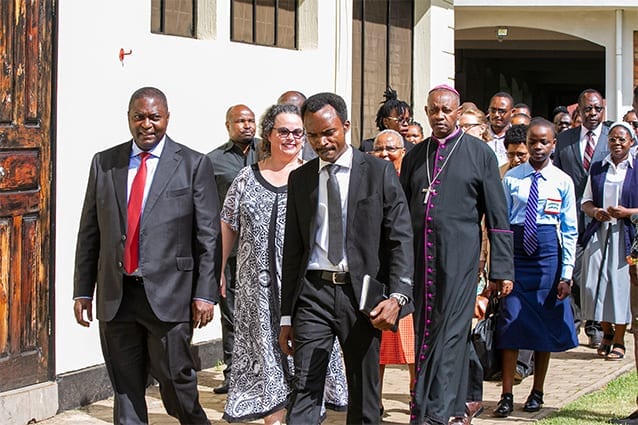
Behind them walk parent representatives of St Jude’s students, members of the school board and academic management and their families. They are walking towards an archway decorated with white tufts of fabric made to resemble flowers. Stretching across this archway is a yellow ceremonial ribbon – the entrance to the new girls’ school.
Academic Manager, Mr Mcharo steps forward, “I would like to invite our School Founder, Gemma Sisia, to speak to you all.”
Gemma takes the microphone, gazing out at the audience.
“We opened this school back in 2002 with three kids,” she says, pausing to gain her composure, jokingly pretending to hit herself to stop the tears that are welling up. The audience laughs.
“We would never have got here without the incredible faith and generosity of our sponsors and donors, the unbelievable commitment of our staff and parents and, of course, our students.”
Archbishop Amani steps forward to bless the school and the audience, heads bowed.
Finally, the moment the crowd has eagerly been waiting for – the unveiling of the sign and the cutting of the ribbon. This historic gesture has been given to Attorney-General (and Professor) Adelardus Kilangi.
Professor Kilangi cuts the ribbon with a smile, the crowd cheers, and the school is officially open.
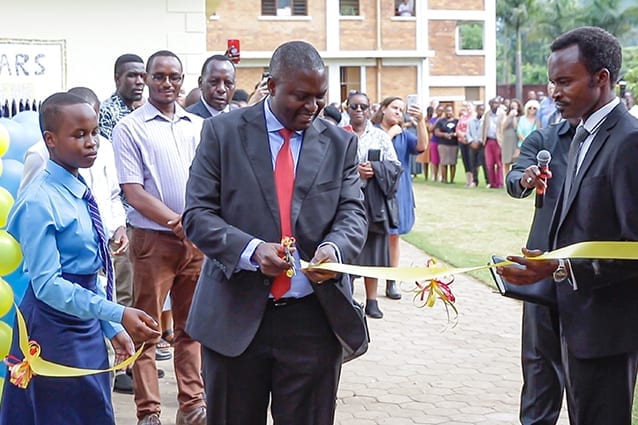
As the honoured guests, staff and choir walk up the new footpath and around the bend, they are greeted by the entire student and staff body of The School of St Jude – over 2,000 people in total. They sing and cheer as one.
As everyone settles into their seats, the speeches begin, Professor Kilangi steps on to the stage, invited to give a keynote address.
“When I first came here to St Jude’s I saw faces full of hope,” says Professor Kilangi to a silently attentive audience.
“Great dreams become a reality if you work hard,” he continues. “If you don’t work hard then they will only remain dreams.”
“The formation of the intellect is the most noble thing you can do. So make sure you work hard, study hard and you will achieve.”

Professor Kilangi looks at the students and pauses, before saying with the hint of a smile, “I’m talking to you kids! What did I say?”
“Work hard! Study hard! Achieve!” the students chorus in response.
The ceremony concludes, with a communal lunch next on the agenda.
Underneath the beating African sun, students, teachers, special guests, visitors, sponsors and donors sit side-by-side. Their plates are full of food and they talk about their dreams; they laugh at jokes, exchange stories and reminisce about the past.
These conversations, full of hope and laughter, are the kind of conversations that can only be had at the beginning of a new year, and the beginning of a new era.
Help St Jude’s continue to take bold steps by donating today.
Anne Bailey sits in the primary assembly hall, facing out across the lawn. She stares at a building with a low-hanging, green tin roof – the first-ever building of St Jude’s, which today is the Visitors’ Centre.
Behind this stands a building that looks like a house. Indeed, in the very early days, it used to be the home of Founder, Gemma and her husband, Richard. Today it hosts the IT Department.
As Anne looks out, she recalls the story of how her daughter, Angela, once stood there with Gemma, looking out over what was nothing but a cornfield.
Gemma turns to Angela and announces – “I’m going to build a school here!”
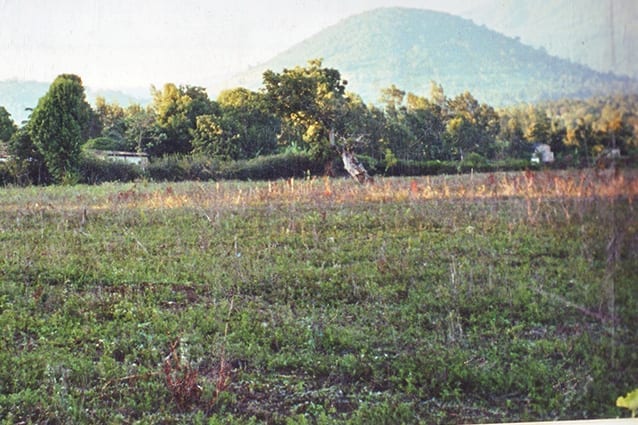
“We’ve always believed in Gemma and her vision,” Anne explains. With her daughter having travelled halfway across the world to join in the venture, it’s easy to see why Anne was keen to remain optimistic.
Today, Anne is spending time with the new Form 1 students, helping them to settle into St Jude’s. With a background in English Second Language (ESL) teaching and decades’ worth of experience assisting adults and children by teaching intensive English courses, she is a particularly useful visitor.
Unlike the students who have continued into secondary from studying at St Jude’s primary school, the new Form 1s who have joined this year from government schools have never had their lessons taught in English before, and are some way behind their peers in comprehension and confidence.
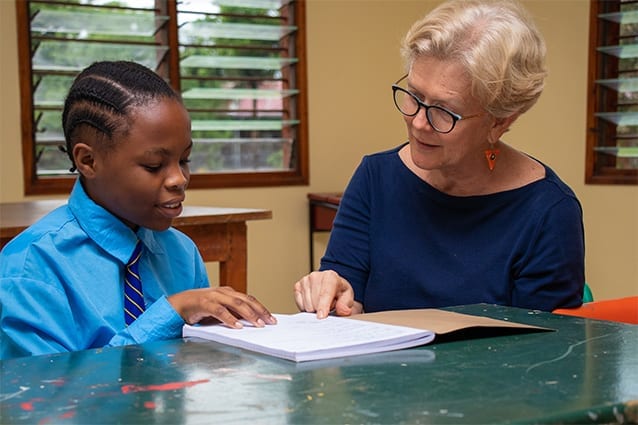
But she is also here to be with her daughter, Deputy Director of St Jude’s, Angela, as the school celebrates yet another landmark – the opening of St Jude’s Girls’ Secondary School.
Over the past 18 years, there has been an enormous amount of people along the way who have helped make St Jude’s the school it is today. Teachers, volunteers, sponsors and of course, the students.
The Bailey family have been with St Jude’s since the beginning, maintaining a connection that lasts to this day.
“I remember when the library was first built – it had a staircase to the second floor,” says Anne. “One of the parents had never used stairs before, these are the things you remember.”
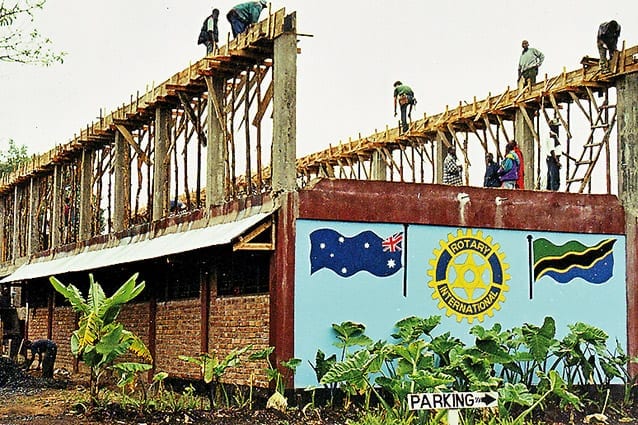
Back then, the road outside St Jude’s was filled with potholes, rocks and dirt (today it’s made of tarmac) and the only way to get into town was by hitching a ride.
As we begin 2020, St Jude’s has close to 1,800 students, and 400 of them are in the midst of celebrating the opening of their very own St Jude’s Girls’ Secondary School. The importance of educating girls resonates with Anne.
“When I was younger there were less chances to go to university,” says Anne, who is now 67 years old.
In the 90’s she decided to go to university as a mature-age student, and during her time there she met other women who were a similar age to her. She remembers one friend who had had to leave school so she could work to support her brother’s education.
“When I was in my 20’s people tended to marry younger,” says Anne. “Women were more likely to be bringing up a family than setting out on a career path and some people thought it wasn’t necessary for women to have a tertiary education.”
Times and attitudes have changed in her homeland, Australia, since then and Anne sees a new horizon for the girls attending St Jude’s now too.
“These girls will be able to follow their passions and go far,” says Anne. “They just have to go for it!”
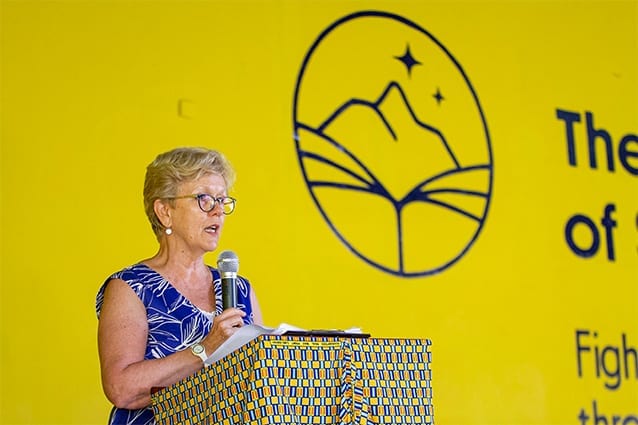
Angela, agrees.
“They should be able to be independent and follow their dreams,” says Angela. “And if they get married, it should be their choice.”
For Anne and Angela both, the opening ceremony for the girls’ school will be a day to remember.
“I was walking through the girls’ school yesterday,” says Angela. “And one of the Form 1 students who I’ve known since primary school called out to me.”
“I asked her how she felt and she said she was really excited. That’s when it sunk in for me and I thought to myself – “this is such an awesome thing!”
A smoky mist hangs over the school grounds, as often seen after a fireworks display, only this particular mist is coming from a busy kitchen. The air is humid, carrying extra weight.
This morning is the first day of classes at St Jude’s Girls’ Secondary School.
Hundreds of students begin filing in, walking along the footpath leading into their new school, heads swiveling as they drink in their new surroundings. Some hold hands, and all are smiling.
The girls line up outside the kitchens, where a group of men are cooking beans and rice.
In front of them is Ms Yukunda, who will begin the day.
“Morning girls,” she says, stretching her arms in welcome. “What is the name of this new school?”
“New Girls,” the students respond.
“Pardon?” says Ms Yukunda, hand to ear.
“New Girls!” say the students, their strong voices echoing around the grounds.
“This is a new school, a new culture,” says Ms Yukunda. “You are here to walk majestically. Are we together?”
“Yes!”
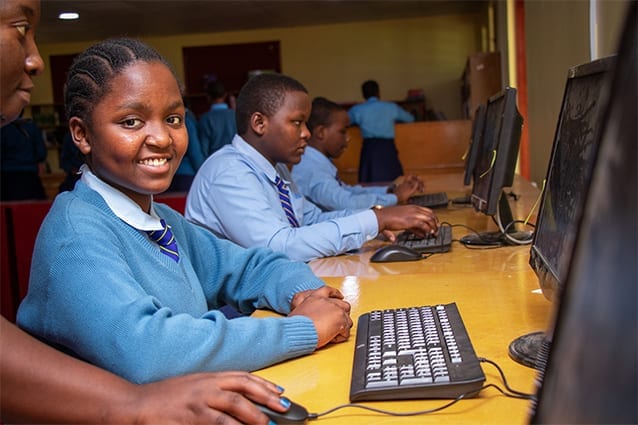
St Jude’s Girls’ Secondary School is the only one of its kind in Tanzania, offering a 100% free, high-quality education to hundreds of girls.
In Tanzania, females receive an average of four and a half years of education. This means that by the age of 12, most girls will have left school.
Instead of being in school, teenage girls will face pressures to marry early and remain at home, raising children and caring for the home.
More than 1 in 4 Tanzanian girls will have a baby before the age of 19.
Education is the key to changing this current reality and breaking the cycle of poverty for future generations.
Educated women are less likely to marry early, less likely to die in childbirth; more likely to have babies that are healthy; and, importantly, more likely to send and keep their own children in school.
Standing before Ms Yukunda, tall and proud, are a gathering of girls who have aspirations that extend beyond the confines of their home.
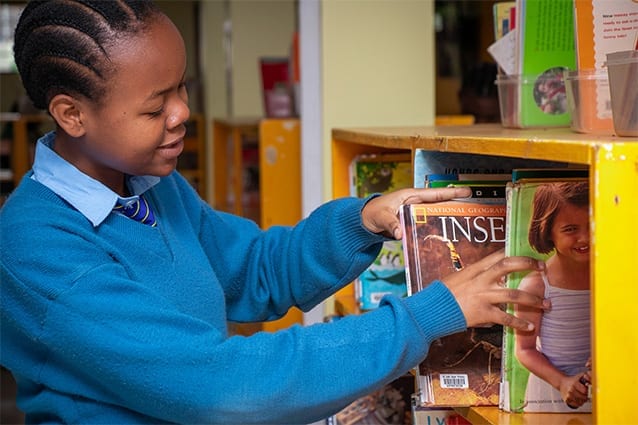
Among these girls, at the front, stands Nasabi who wants to be a doctor and Sara who wants to study law. At the back is Yunis who wants to be an accountant, Brenda who wants to study business and Gift who wants to be a nurse. A crowd of girls, a collection of dreams.
At their disposal is a school with brand new science labs, sports grounds, computers and a library filled with hundreds and hundreds of books.
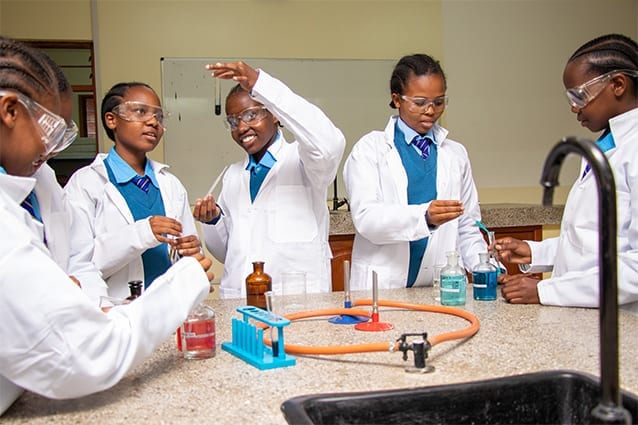
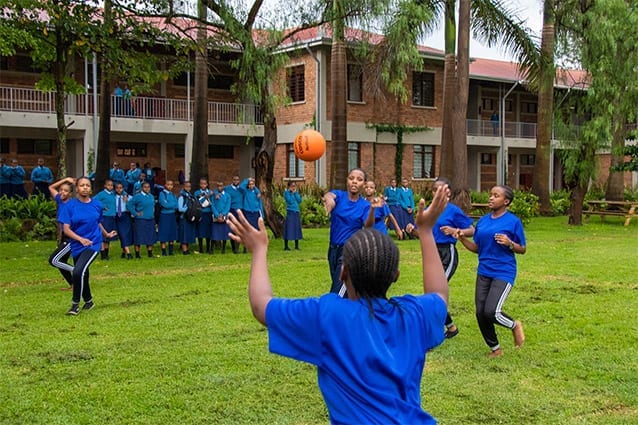
After a brief run-down of the new campus the students are dismissed and the day begins in earnest.
Today, these girls will sit in chemistry labs and study elements and compounds; they will sit in classrooms and learn about algebra and trigonometry; they will find some quiet time in the library and read Jane Austen and Louisa M. Alcott, or Chimamanda Ngozi Adichie and Buchi Emecheta.
And in all of these classrooms, these girls will be forging their futures. Futures that will help ensure the prosperity of their families, communities and of Tanzania.
Help St Jude’s provide an education to the female lawyers, accountants, doctors and nurses of tomorrow by donating to St Jude’s today.